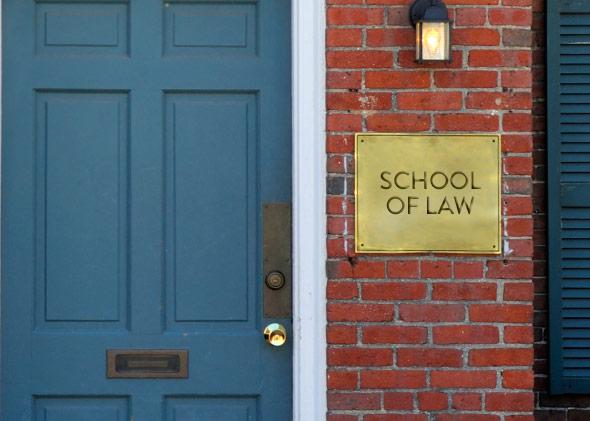The debate over law schools can sometimes feel a bit rote. Critics say they scam students by promising high-paying careers that never materialize. Defenders say that, actually, J.D.s do quite a bit better for themselves on the job market than many of the most harrowing stories would suggest.
So give Noah Feldman some points for creativity. In a recent Bloomberg View column, the Harvard Law professor mounted one of the most straightforward and eloquent defenses of ripping off students I have ever encountered.
To be fair, Feldman probably wouldn’t describe his argument quite in those terms. At the moment, there is mounting evidence that law schools, desperate to put warm bodies in their classrooms, have started admitting a great number of students whose low LSAT scores suggest they will have trouble passing a state bar exam. This is problematic, because without passing a state bar exam, you can’t practice law in most of the country. And so some have suggested that maybe, just maybe, admissions officers ought to tighten their standards somewhat at the cost of revenue, rather than let in anybody willing to take on the debt necessary to cut a tuition check.
Feldman finds this “growing conventional wisdom” that schools shouldn’t “admit students who are statistically uncertain to pass the bar” deeply troublesome. “This view assumes that it’s up to the law schools to make the threshold decision paternalistically, ‘saving’ naive college graduates from pursuing the dream of becoming lawyers when there’s no guarantee that they’ll succeed,” he writes. “It treats standardized test scores as destiny and correlation-based studies as gospel.”
In Feldman’s view, denying applicants with bottom-basement LSAT scores the opportunity to attend law school at great personal expense would amount to the “infantalization” of young college graduates. “Do we really need to protect people from trying to achieve their dreams?” he asks. Looked at the right way, low bar-passage rates could even be considered a positive sign. “If all law students were passing the bar, it would be a sign that law schools weren’t taking a chance on students at the margin of the capacity to succeed,” Feldman writes.
In other words, law schools should be lauded for extracting money from the students least prepared to excel at them. Bold stance, professor.
It’s worth noting here that Feldman’s view directly contradicts the American Bar Association’s accreditation rules, which explicitly state: “A law school shall not admit an applicant who does not appear capable of satisfactorily completing its program of legal education and being admitted to the bar.” In other words, the ABA doesn’t care about your hopes and dreams of becoming Jack McCoy if you don’t stand a chance of becoming a licensed attorney. This is quite reasonable. Academics may wax lyrical about all the lovely things one can do with a law degree (Feldman helpfully reminds us that Harvard Law grads include hedge-fund managers and presidents), but in the end, law schools mostly exist to mint lawyers. And insofar as they fail to do that, they’re whiffing on their most basic function. The problem with the ABA standards, as I’ve written before, is that there isn’t much agreement yet on what counts as an unacceptably low LSAT score. That’s why many would like to see schools start by being more transparent about the relationship between standardized test scores and bar passage so students can better decide for themselves whether a J.D. is right for them.
Which brings us to the bigger issues.
First, Feldman is very much arguing against a straw man. Nobody, to my knowledge, has suggested that law schools adopt a minimum LSAT score. Nor is anyone arguing that institutions should have a 100 percent bar-passage rate. Law School Transparency, the advocacy group that has spearheaded this whole debate, argues that the threshold should essentially be raised to 85 percent (the current formula is complicated and easily gamed but is meant to ensure that roughly 75 percent of those who take the bar pass in a typical year).
Second, while some law professors may be comfortable watching their former students fail the bar while carrying six figures worth of debt, nobody in their right mind would call that a socially or economically optimal outcome. (Hint: Most 25-year-olds who attend a bottom-tier law school and can’t cut it on a licensing exam aren’t headed for the White House.*) Given that law schools are basically funded through the federal student loan program, a lot of people would argue that they have some broader social responsibility not to act like parasites. And if they fail to meet said responsibility, the government might just start exploring ways to intervene.
The point of raising admissions standards isn’t to push out every last borderline student. It’s to discourage schools from keeping themselves in business by preying on obviously incapable applicants, who may not have any idea what they’re getting into when they borrow $100,000 for a potentially useless degree. Maybe that’s too “paternalistic” for Feldman. But the entire practice of law is predicated on the idea that attorneys have a duty to protect their clients’ best interests and advise them against obviously self-destructive behavior. It seems reasonable to ask law schools to abide by a similar set of ethics and refrain from ripping off students who don’t have a prayer of succeeding in the career they’re supposedly preparing for.
*Insert Hillary Clinton failing the bar joke here.
